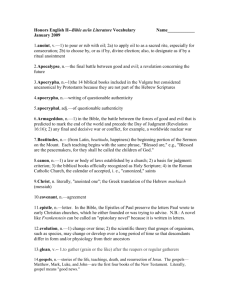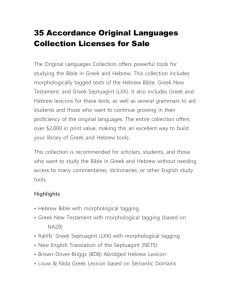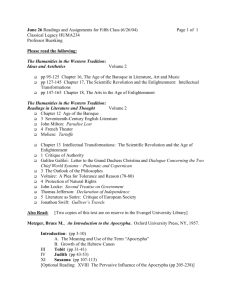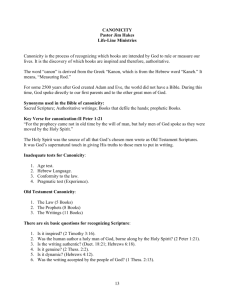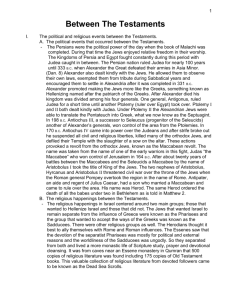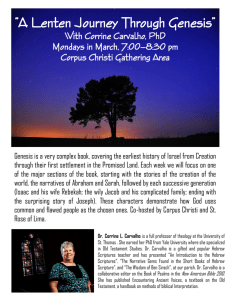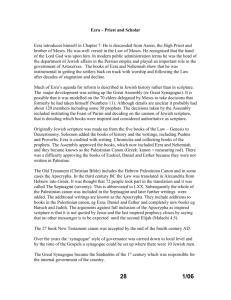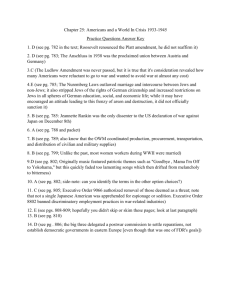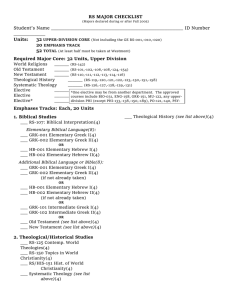An Introduction to the Deutero-Canonical Books
advertisement
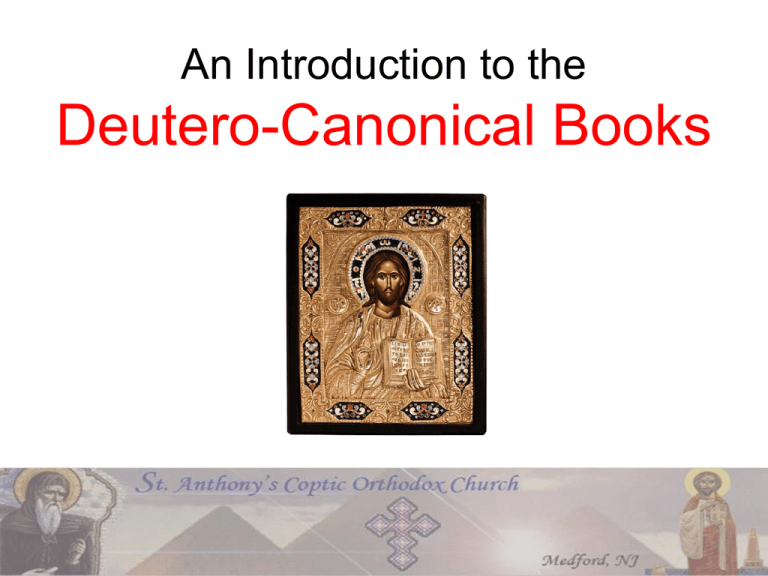
An Introduction to the Deutero-Canonical Books What is the Apocrypha? “Apocrypha” Greek word: Literally means “things that are hidden.” Books that appeared in the Greek (Septuagint), Latin (Vulgate), Coptic (and its Arabic version), as well as the Syriac and other translations of the Old Testament, but are not included in the original Hebrew Scriptures. All are considered canonical (hence the word deutero-canonical or second canonical) and authoritative by all Orthodox Churches and by the Roman Catholic Church. Martin Luther: “books which are not held equal to the Sacred Scriptures, and nevertheless are useful and good to read.” In his translation of the Bible into German, Martin Luther differentiated the books originally in Hebrew from those of Greek origin. The latter he labeled the Apocrypha. What is the Apocrypha? When the King James or Authorized Version of the Bible was published in 1611, it contained, between the Old and the New Testaments, the books of the Apocrypha. Other Protestant leaders simply omitted these writings from their Bibles, and the Westminster Confession (1646) dismissed them as non-biblical, secular literature. In the course of time printers began to issue editions of the King James Bible without the books of the Apocrypha. The Deutero-Canonical Books Tobit Judith The Additions to the Book of Esther (Verses 10:3a-k) Wisdom of Solomon Ecclesiasticus, or the Wisdom of Jesus Son of Sirach Baruch The Letter (Epistle) of Jeremiah (= Baruch Chapter 6) The 3 additions to the Book of Daniel: The Prayer of Azariah and the Song of the Three Jews (68 verses between 3:23 – 24) Susanna (= Chapter 13 or in the beginning) Bel and the Dragon (= Chapter 14 or at the end of Chapter 12) The Deutero-Canonical Books 1 Maccabees 2 Maccabees Psalm 151: follows Psalm 150 in the Greek Bible (not included in the Roman Canon) The Role of Ezra the Priest Ezra was a famous Jewish priest of the tribe of Levi, and a descendant of Aaron. He was the first scribe. He was born during the period of exile and he lead the second group of returning Jews from Babylon to Jerusalem in 458 BC. During the period of exile, many copies of the Scriptures were either destroyed or lost. Furthermore, many of the Jews born in exile were Hebrew-illiterate and therefore unable to read their own Scriptures. Ezra's greatest contribution was his teaching, establishing, and implementing the Five Books of Moses among the Jews. The Role of Ezra the Priest (Ezra 7:6-10 NKJV) 6This Ezra came up from Babylon; and he was a skilled scribe in the Law of Moses, which the LORD God of Israel had given. The king granted him all his request, according to the hand of the LORD his God upon him. 7Some of the children of Israel, the priests, the Levites, the singers, the gatekeepers, and the Nethinim came up to Jerusalem in the seventh year of King Artaxerxes. 8And Ezra came to Jerusalem in the fifth month, which was in the seventh year of the king. 9On the first day of the first month he began his journey from Babylon, and on the first day of the fifth month he came to Jerusalem, according to the good hand of his God upon him. 10For Ezra had prepared his heart to seek the Law of the LORD, and to do it, and to teach statutes and ordinances in Israel. (Neh 9:3 NKJV) And they stood up in their place and read from the Book of the Law of the LORD their God. The Role of Ezra the Priest He was the first person to compile the Jewish Scriptures into one collection. Jewish tradition says he authored Chronicles and Ezra-Nehemiah. Ezra is sometimes called “the father of Judaism,” though others offer a different opinion. He did most to codify, emphasize, and sent up the Law of Moses. The Ritual of Transcribing Hebrew Scripture The scribes were specially chosen people who transcribed the Holy Scriptures according to rigorous standards determined by the Jewish High Council. (The council, which was founded by Ezra, had three essential principles; the third required the Jews to be a solid fortress in protecting the Torah.) (Rom 3:1-2 NKJV) What advantage then has the Jew, or what is the profit of circumcision? Much in every way! Chiefly because to them were committed the oracles of God. The Ritual of Transcribing Hebrew Scripture Scribes were ordered to follow the following traditions: Before transcribing bathe, wear the special Hebrew clothes and prepare your mind with holy submissive thoughts. Use scrolls made from the skins of pure animals. Use pure black ink made of charcoal and coke powder mixed in gum. Do not write a single word out of memory, always look at the original text and read out loud the word before copying it. Before writing any of God’s names, pause and clean your pen; and before writing the name of the Almighty, wash your entire body. At the end of your transcription, if you find three or more errors destroy this copy and start all over. The Ritual of Transcribing Hebrew Scripture Scribes were ordered to follow the following traditions: You should know how many letters are in a page before starting to transcribe it. Each page should contain 30 equal lines. Count the number of times each letter occurred in each page and in the entire book. Do not talk with other people during the transcription session. The Septuagint After the death of Alexander the Great, Egypt and later Palestine fell under the rule of Ptolemy I Soter, and his successors. The Ptolemies made Alexandria a center of learning and commerce. Ptolemaic rule directly impacted Jews both inside and outside of Palestine. Ptolemy I Soter (323-283 BC) transported large numbers of Jews from Palestine to Alexandria for settlement. This was the beginning of a large and influential Jewish community, which prospered by maintaining good relations with the Ptolemies, frequently serving as mercenaries and merchants. Soon Alexandria became a major center of world Jewish culture. The Alexandrian Jews imbibed Hellenism (the Greek culture) much more deeply than the Jews of Judea. The Septuagint This Hellenization trend necessitated the translation of the Old Testament writings into Greek. Ptolemy II Philadelphus (282-246 BC) built the School of Alexandria, to help spread the Greek culture and philosophy. He then arranged with the Jewish High Priest in Jerusalem to send 72 translators (six elders from each of the twelve tribes of Israel) to Alexandria. As they sailed from Judea to Alexandria, two of them died during the trip, while the rest arrived in Alexandria and started the translation of the Hebrew Scriptures into Greek (280 BC). This translation, called the Septuagint (or LXX), in its complete form, became widely used in the Greeko-Roman Empire around the time of Jesus Christ. The Septuagint It included all the second canonical books recognized by our Coptic Church. There are at least three complete and concordant historical manuscripts of this version: the Codex Vaticanus (4th century AD), the Codex Sinaiticus (4th century AD) and the Codex Alexandrinus (5th century AD), as well as numerous less complete or more recent manuscripts. The Dead Sea Scrolls Between 1946 - 1960 AD, about 40,000 fragments of 800 ancient manuscripts were discovered and retrieved from eleven caves near the Dead Sea (the caves of Qumran). Of these 170 are fragments of Old Testament books (including manuscripts of each Old Testament book except Esther). The most important may be a nearly complete text of Isaiah. The rest of the scrolls include commentaries on Habakkuk and Micah, Jewish documents from the interbiblical and New Testament time periods – including parts of the deutero-canonical writings, as well as writings that describe the community at Qumran and the lifestyle of the Essene Jews that inhabited them. Scrolls were found in Hebrew, Aramaic, and Greek. The Dead Sea Scrolls The scrolls themselves have been dated to about 200 BC to 70 AD, and are believed to have been transcribed by the Essenes (who lived during that period). The Dead Sea Scrolls provide Old Testament Hebrew manuscripts, which are one thousand years older than any other Old Testament manuscripts. Before 1947, the earliest Hebrew Old Testament manuscripts known to exist dated to the late ninth century AD (the Masoretic Jews). Josephus A Jewish Historian (37-100 AD). He listed 22 of the books that Ezra had compiled, and which became the basis of the Hebrew Canon established by the council of Jamnia (100 AD). From that point onwards, a standard Hebrew text has been recognized. Josephus He also referred to the deutero-canonical books: “It is true, our history has been written since Artaxerxes very particularly, but has not been esteemed of the like authority with the former (i.e. Older Scriptures) by our forefathers, because there has not been an exact succession of prophets since that time. How firmly we have given credit to those books of our own nation, is evident by what we do; for during so many ages as have already passed, no one has been so bold as either to add anything to them, to take anything from them, or to make any change in them. But it becomes natural to all Jews immediately and from their very birth, to esteem those books to contain divine doctrines, and to persist in them, and if occasion be, willingly to die for them.” (Josephus Against Apion, 1.8:41-42) The Hidden Books There are probably many reasons why Ezra, and later the Council of Jamnia, did not include all the books of the Septuagint when compiling the Jewish Scriptures. 1 Maccabees covers the period 180 – 135 BC after the time of Ezra. 2 Maccabees was originally written in Greek. Similarly, the Wisdom of Ben Sirach was written in the third century BC, and translated to Greek by his grandson in the late second century BC. Only then was it added to the Septuagint. The book of Tobit stayed as a family secret and heritage until the second century BC, when it was released to the public. The Hidden Books There are probably many reasons why Ezra, and later the Council of Jamnia, did not include all the books of the Septuagint when compiling the Jewish Scriptures. The Hebrew version of the book of Esther: Makes no mention of the name of God, the God of the Jews. This is possibly explained on the basis of the political climate at that time. This version was accessible to the non-Jews, including their enemies, and were routinely read every year during the Purim festivities. The “hidden” chapters however, which are found only in the Greek version, show a deep spiritual attitude of worship towards the Almighty Sovereign God. Prior to the first century, there was an emerging distinction between the books of scripture which are to be available to the public and the others which are to be “hidden,” and thus kept from public access, since the wisdom of God is reserved for the elect community alone. The Hidden Books This tradition of secret writings may be the origin of the notion that some of the biblical books were to be kept “hidden” (apocrypha). But by the end of the first century AD there were Jews who were dismissing as non-authoritative many of the writings that the editors of the Septuagint had treated as biblical by the very act of including them among the scriptures in Greek. There were over 70 “hidden” books, many of which were written in Greek. In a curious shift of connotations, the term that for some Jews initially implied “secret” was now used by Protestants to mean inauthentic and lacking in authority for the community of faith. In spite of this historical division of opinion among church bodies about the Apocrypha, in recent decades important translations of the Bible initiated by Protestants have included these works as part of the body of Sacred Scripture The Masoretic Jews These Jews were scholars who lived during the seventh to tenth centuries AD. They edited the Hebrew text into its current version. They also added to it vowel sounds, rendering it more readable to non-natives. Other Translations Of The Old Testament The Coptic Translation: This spread throughout Egypt during the second and third centuries. By the mid-third century, it was widely used in our churches. We still have most passages of scripture retained in the Coptic language. The Latin Vulgate: The first official Latin Bible was translated by St. Jerome during the fourth century at the request of the Roman Pope Damasus. (“Vulgate” means “for the people as a whole”) St. Jerome added prefaces to the deutero-canonical books, noting their absence in the Hebrew canon. The Vulgate also includes the two books of Esdras and the Prayer of Manasseh, as an addendum. These books are considered apocryphal rather than canonical by the Catholic Church. The Apocrypha in The New Testament Wis Sol 13:5,8 (NRSVA) 5For Rom 1:20-25,29 (NKJV) 20For since from the greatness and beauty of the creation of the world His invisible created things comes a attributes are clearly seen, being corresponding perception of their understood by the things that are made, Creator. 8Yet again, not even they even His eternal power and Godhead, are to be excused. so that they are without excuse, 21because, although they knew God, Wis Sol 14:24,27 (NRSVA) 24they they did not glorify Him as God, nor no longer keep either their lives or were thankful, but became futile in their their marriages pure, but they thoughts, and their foolish hearts were either treacherously kill one darkened. 22Professing to be wise, they another, or grieve one another by became fools, 23and changed the glory adultery, 27For the worship of idols of the incorruptible God into an image not to be named is the beginning made like corruptible man—and birds and cause and end of every evil. The Apocrypha in The New Testament Wis Sol 13:5,8 (NRSVA) 5For and four-footed animals and creeping from the greatness and beauty of things. 24Therefore God also gave them created things comes a up to uncleanness, in the lusts of their corresponding perception of their hearts, to dishonor their bodies among Creator. 8Yet again, not even they themselves, 25who exchanged the truth are to be excused. of God for the lie, and worshiped and served the creature rather than the Wis Sol 14:24,27 (NRSVA) 24they Creator, who is blessed forever. Amen. no longer keep either their lives or …29being filled with all their marriages pure, but they unrighteousness, sexual immorality, either treacherously kill one wickedness, covetousness, another, or grieve one another by maliciousness; full of envy, murder, adultery, 27For the worship of idols strife, deceit, evil-mindedness; they are not to be named is the beginning and cause and end of every evil. whisperers. The Apocrypha in The New Testament Wis Sol 12:12,20 (NRSVA) 12For Rom 9:20-23 (NKJV) 20But indeed, O who will say, “What have you man, who are you to reply against done?” or will resist your God? Will the thing formed say to him judgment? Who will accuse you who formed it, “Why have you made me for the destruction of nations that like this?” 21Does not the potter have you made? Or who will come power over the clay, from the same before you to plead as an lump to make one vessel for honor and advocate for the unrighteous? another for dishonor? 22What if God, 20For if you punished with such wanting to show His wrath and to make great care and indulgence the His power known, endured with much enemies of your servants and longsuffering the vessels of wrath those deserving of death, granting prepared for destruction, 23and that He them time and opportunity to give might make known the riches of His up their wickedness. glory on the vessels of mercy, which He had prepared beforehand for glory. The Apocrypha in The New Testament Wis Sol 15:7 (NRSVA) A potter kneads the soft earth and laboriously molds each vessel for our service, fashioning out of the same clay both the vessels that serve clean uses and those for contrary uses, making all alike; but which shall be the use of each of them the worker in clay decides. Rom 9:20-23 (NKJV) 20But indeed, O man, who are you to reply against God? Will the thing formed say to him who formed it, “Why have you made me like this?” 21Does not the potter have power over the clay, from the same lump to make one vessel for honor and another for dishonor? 22What if God, wanting to show His wrath and to make His power known, endured with much longsuffering the vessels of wrath prepared for destruction, 23and that He might make known the riches of His glory on the vessels of mercy, which He had prepared beforehand for glory. The Apocrypha in The New Testament Wis Sol 9:15 (NRSVA) for a 2 Cor 5:1,4 (NKJV) 1For we know that perishable body weighs down the if our earthly house, this tent, is soul, and this earthy tent burdens destroyed, we have a building from the thoughtful mind. God, a house not made with hands, eternal in the heavens. 4For we who are in this tent groan, being burdened, not because we want to be unclothed, but further clothed, that mortality may be swallowed up by life. Sirach 5:11 (NRSVA) Be quick to James 1:19 (NKJV) So then, my hear, but deliberate in answering. beloved brethren, let every man be swift to hear, slow to speak, slow to wrath. The Apocrypha in The New Testament Sirach 15:11-12 (NRSVA) 11 Do James 1:13 (NKJV) Let no one say not say, “It was the Lord’s doing when he is tempted, “I am tempted by that I fell away”; for He does not God”; for God cannot be tempted by do what he hates. 12Do not say, “It evil, nor does He Himself tempt was He who led me astray”; for he anyone. has no need of the sinful. The Apocrypha in The New Testament Wis Sol 7:25 (NRSVA) For she is Heb 1:3 (NKJV) who being the a breath of the power of God & a brightness of His glory and the express pure emanation of the glory of the image of His person, and upholding all Almighty; therefore nothing defiled things by the word of His power, when gains entrance into her. He had by Himself purged our sins, sat down at the right hand of the Majesty on high. 1 Maccabees 4:59 (NRSVA) Then Judas and his brothers and John 10:22 (NKJV) Now it was the Feast of Dedication in Jerusalem, and it all the assembly of Israel was winter. determined that every year at that season the days of dedication of the altar should be observed with joy and gladness for eight days, beginning with the twenty-fifth day of the month of Chislev. Canonicity of the Apocrypha Many early church fathers (first four centuries, as is evident in the Apostolic Fathers) quoted these books in their teachings: Irenaeus, Tertullian, Clement of Alexandria and Cyprian (none of whom knew any Hebrew) quoted passages from the deuterocanonical books, as “divine Scripture” and “inspired”. Hippolytus of Rome (170-230? AD) included in his Commentary on Daniel passages from the Additions to Daniel (Susanna and the Song of the Three Jews). Others as Clement of Rome, Polycarp, Origen, Ambrose, Basil, Hilary, Chrysostom, Augustine, Gregory of Nazianzus, Cyril of Jerusalem, Epiphanius, Eusabius and Athanasius of Alexandria also used these books freely. Saint Athanasius in the fourth century listed these books as canonical. Augustine (354-430 AD) treated them as canonical. Canonicity of the Apocrypha Numerous church councils confirmed their canonicity such as the Council of Hippo (393 AD), and Carthage (397 & 419). In reaction to the Protestant criticism of these books, the Council of Trent (April 8, 1546 by the Roman Catholics) declared the infallibility and canonicity of these books. They pronounced an anathema upon anyone who “does not accept as sacred and canonical the aforesaid books in their entirety and with all their parts … ” The Greek Orthodox Church adopted as authoritative a list of these books that were dismissed by Protestants as “apocryphal.” Our Coptic Church also considers them fully canonical. We include many deuterocanonical passages in our prayers and liturgy, especially during Lent and Holy Week (eg: Prayer of the 3 Young Men, Susanna, Tobit, Psalm 151, readings from Sirach) Classification of the OT Books
